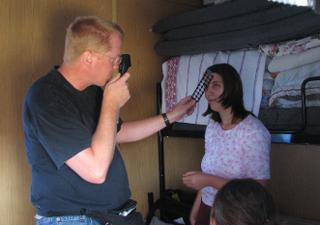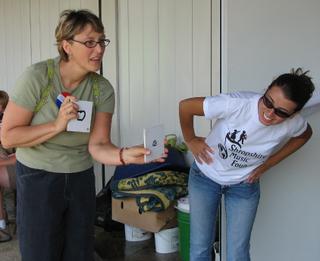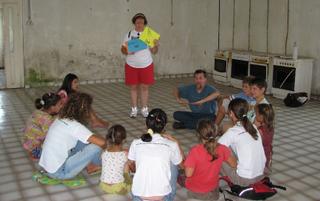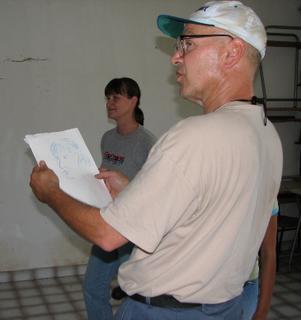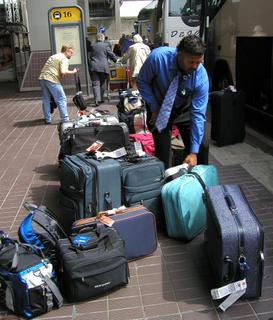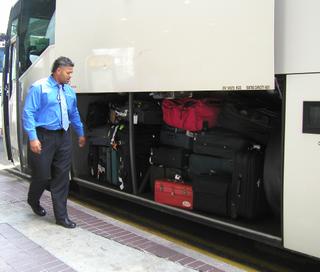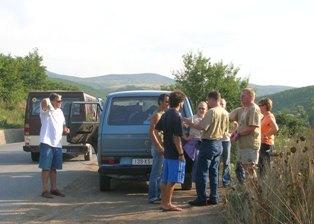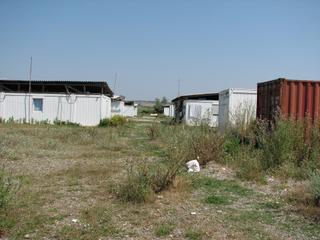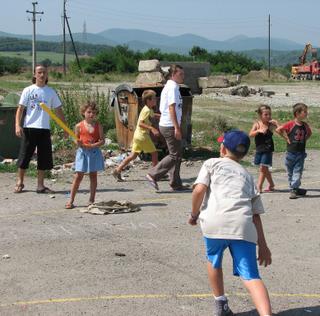Five years of dreaming, more than a year of planning, and countless fundraisers later; it has all come down to this.
32 passengers
42 checked bags (nearly all at the maximum weight of 70 pounds)
70-plus carry-on bags
1 Wesley United Methodist Church Bus
1 Large Passenger Van
The long journey to Kosovo started at 12:30pm on Monday, July 25th in the Wesley United Methodist Church parking lot. Getting to the meeting point was the easy part. Figuring out a way to get both passengers AND luggage into the two vehicles taking us to Chicago was much, much harder. Our large, overstuffed suitcases quickly filled the back of the Wesley bus and the van’s luggage hauling capacity was pretty limited.
So we resorted to drastic measures.
We packed the back two rows of the bus with youth participants and one adult (Kristi Korpi). Then we packed the aisle between them full of bags (one stacked on top of another). We did the same thing after getting four more people situated into the third row of the bus. Small suitcases and carry-on bags ended up in the storage bins above our heads, on the floor, or in my case on my lap. The scene reminded me of a plane ride I took in Russia once where people sat on their luggage in the aisle of the plane when the airline ran out of seats!
The situation on the van was similar. Youth in the back seat, followed by a mixture of adults and youths filling in the rest of the seats with luggage in between them in the aisle, under the seat and everywhere there was space. Keith Porter was sitting directly behind the front passenger seat with one of my suitcases sitting in front of him. I reminded him that I was in a similar situation the first time we visited Kosovo when the driver we hired to take us to neighboring Macedonia arrived at the border in a Yugo. In that case, I got the short end of the stick and was smashed into the backseat with most of our luggage.
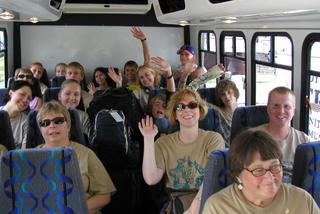
Despite the craziness of finding a place for everyone and the luggage we left the parking lot at exactly 1:00pm (our departure goal). So far, so good.
The ride was hot but otherwise uneventful. We stopped at the McDonalds in Rock Falls for a quick bathroom break. I’m sure we looked more like a series of clowns getting out of a small car than a traveling caravan bound for Kosovo. I had my own laugh when the women of the group were warning those of us still standing in line for the restrooms that the first stall was out of toilet paper. I said, “I have Kleenex packs in my purse. This is a good first test of what awaits you in Kosovo.” The line moved a bit more quickly after that; aided by sharing Kleenex and toilet paper from other stalls.
Smooth SailingWe arrived at O’Hare International Airport only five minutes past our pre-set time of 5:15pm. Again so far, so good.
Unloading the luggage and hauling all of it into the airport took some finesse. But since we arrived three-hours ahead of our departure time we didn’t have to wait in line at the ticket counter. I couldn’t believe it but everyone had a boarding pass and their checked luggage to the large security x-ray machines in terminal in less than 30-minutes. We are flying British Air to London and then taking a second British Air flight to Kosovo’s capital Pristina.
The entire group then made their way to the busy food café just outside of the main security checkpoint in the international terminal. Doreen Borde and I then went to the customs office to register our higher-end equipment (computers, radio equipment and cameras) just in case they question us upon return (more and more customs agents are demanding proof of prior purchase for high-end electronic equipment upon returning to the US). It is a pain to get the paperwork signed but it is far worse to get stopped coming back (like I did coming back from Uganda earlier this year).
The customs agent handling our paperwork asked me my profession and I told him, “I’m a radio journalist.” He asked where we were headed and I responded, “Kosovo.” He winced and then said, “Well at least it’s not vacation.”
“Actually,” I replied, “it is vacation.” He double winced and wished us luck.
After a quick bite to eat the entire group headed for the security screening checkpoint. I was more worried about this step in the process than anything else. But again to my amazement everyone made it through with no problems. I estimate it took less than 10 minutes to get all of us through screening. Whew!
Too Good To Be TrueWe waited about an hour in the gate area before boarding our plane. Things had gone SO smoothly up to this point that I was beginning to wonder when the other shoe would drop.
It dropped as soon as we buckled our seatbelts.
Seemingly out of nowhere a horrific thunderstorm with lighting and wind blew though. The wind was strong enough to sway the aircraft from side-to-side as if we were experiencing turbulence in the air. At one point it was raining so hard that I couldn’t see the plane parked at the next gate and the water cascaded down the side of the plane like a waterfall. In the end the storm delayed our departure by about an hour.
The flight to London itself was uneventful and everyone was really, really good. At least one participant (Diana Baker) had never flown before but she certainly didn’t appear to be scared.
Once we arrived in London we had to clear passport control before claiming our luggage. Lady luck was with us. At passport control they opened a special lane for us since we are traveling as a large group. It helped that we are all wearing our Kosovo Project t-shirts (designed by participant Jon Fasanelli-Cawelti). Lady luck stayed with us as we headed to baggage claim. Every single bag arrived.
Long before the London bombing incidents we chartered a private bus to take us from London’s Heathrow Airport to our hotel near London’s Gatwick airport. Gatwick is more of a European hub and that’s where our flight to Pristina originates. We need to spend the night in London because British Air only flies three days a week to Pristina (Monday, Wednesday, and Friday).
The charter bus from MayDay Travel (I’m not kidding!) was exactly was waiting for us as we exited the airport. It wasn’t until we lined all of our luggage up to be loaded into the cargo hold of the bus that I realized just how much stuff we really are hauling (are you sensing a theme here?).
After loading about a dozen bags the bus driver turned to Keith and said, “Americans always have too much luggage.”
I’m not sure we could have stuffed another suitcase in the cargo hold. It was full when the last suitcase was loaded. But our driver was friendly and despite the dubious name of the company we made it to the Gatwick Travelodge in about an hour.
Killing Time in the BarWe arrived at the hotel just after 1:00pm. None of our rooms were ready since check-in time is 3:00pm so we waited in a lounge area that doubles as the hotel’s bar at night. Some adults slept while others searched for restaurants nearby. The youth played cards and hand-held video games. Keith and I made the arrangements for a series of taxis to pick us up and take us to the airport tomorrow morning.
Eventually we made it to our rooms. But even this wasn’t an easy task. All of our rooms are on the third floor but the two lifts (that’s British for elevator) were not working properly and then finally quit working entirely. This meant we had to haul many of our heavy bags up three full flights of stairs. Luckily, Jon and Mike Hartman with the help of a Travelodge employee brought the remaining bags up the stairs. I am forever grateful since my bags were among the last to make it upstairs! I hope the elevators are working in the morning or it could be a long, long trip down those three flights of stairs.
As for the rooms….what can I say? The rooms are not 4-star. They are what I expect a room to be like at a Travelodge. I am rooming with Lori Carroll. I told Lori she could have the one bed in the room. I took the large sofa. Believe me; I have slept in worse places. Actually, all of our rooms have a similar set-up; one or two beds and a sofa.
It is just after 8:30pm as I finish writing this note and nearly everyone is sleeping (Lori included). I’m sure most of us will wake up early tomorrow morning but at least we will have had a good rest before our journey continues to Gjakove.
Until next time….


